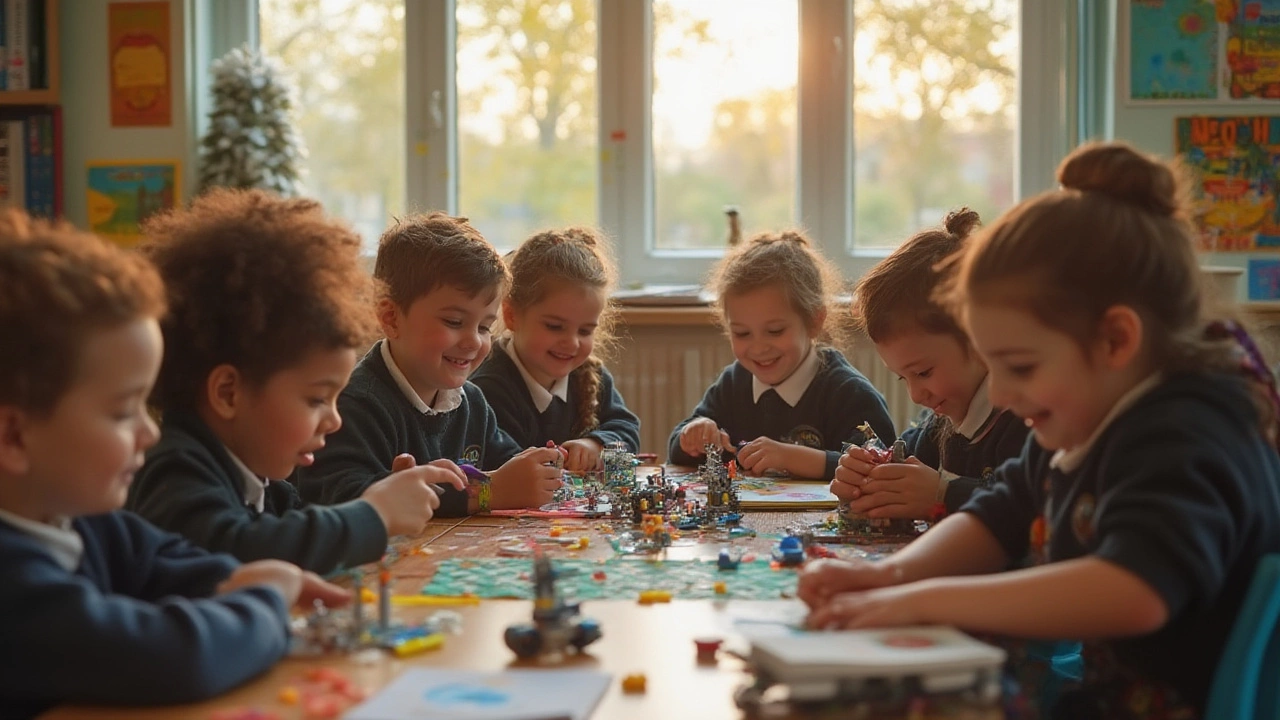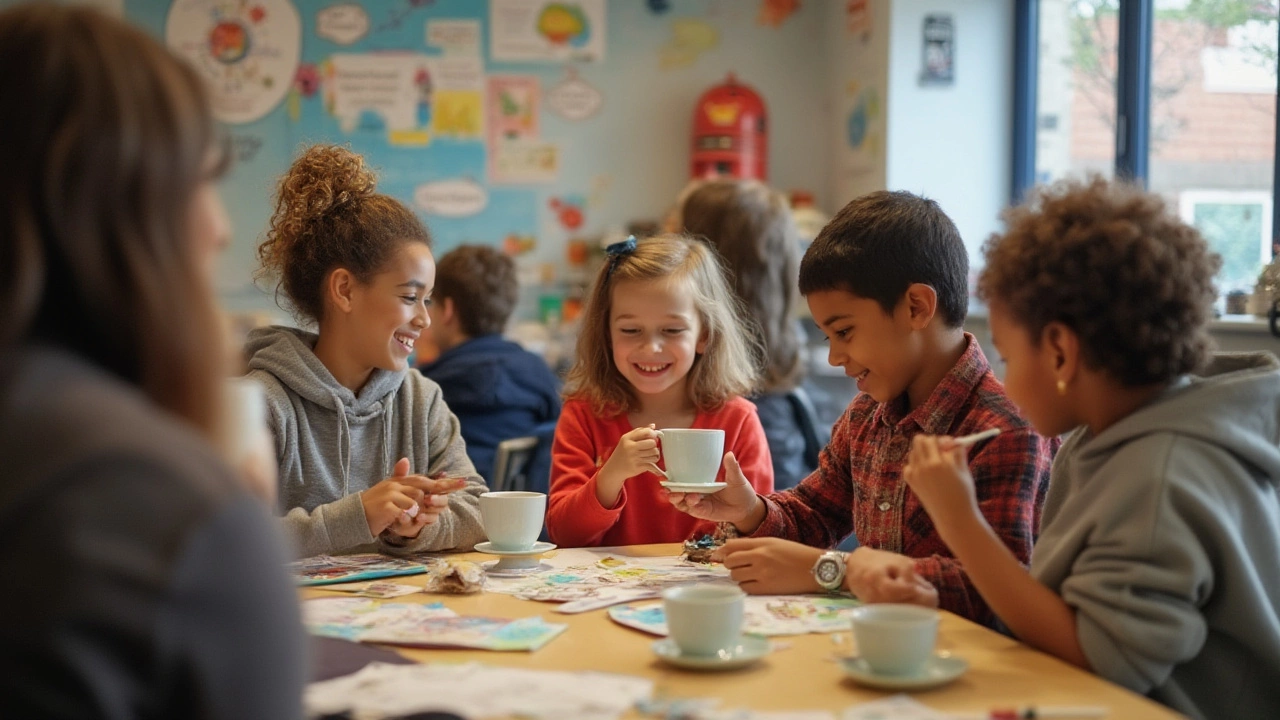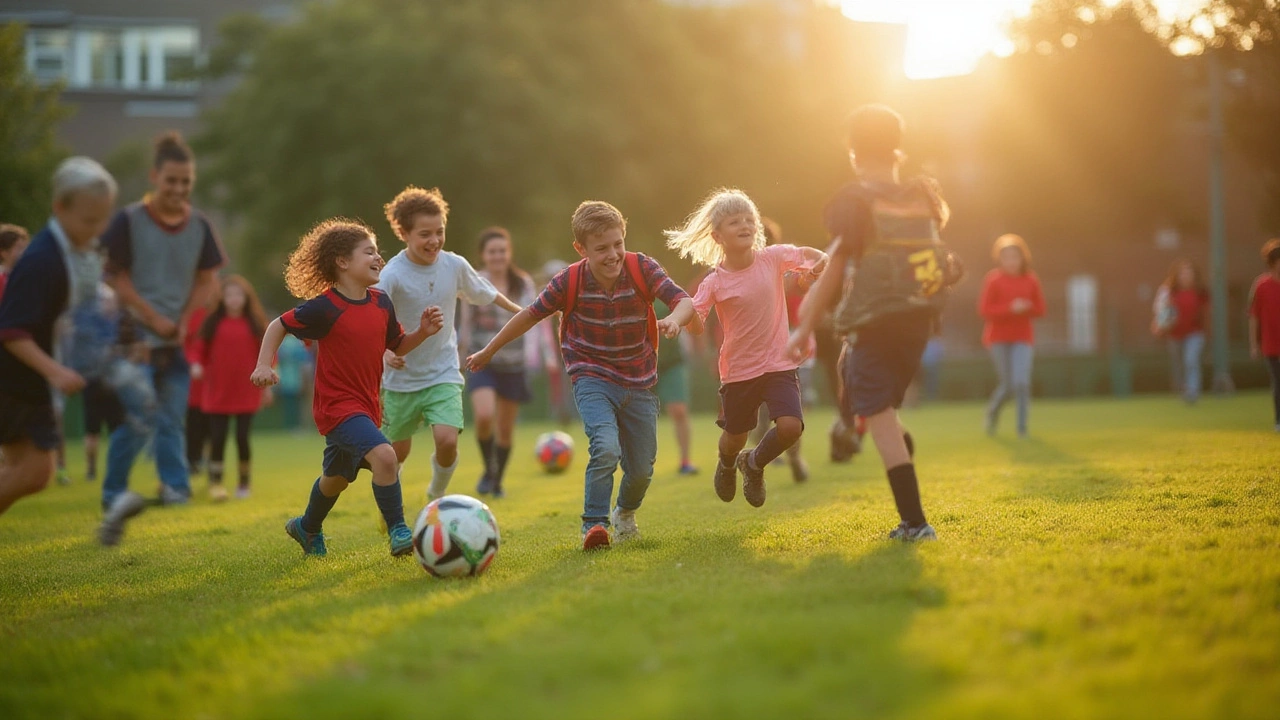Why After School Clubs Matter: The Hidden Benefits for Kids and Families
 Jul, 20 2025
Jul, 20 2025
Someone once told me that the hour between school ending and dinner is the longest one in a parent’s day. Parents of kids with too much energy, meet the magic of after school clubs. It’s not just about filling time. These clubs are changing kids’ lives in ways few people talk about—ways that ripple out to families and neighborhoods in real, practical ways.
What Really Happens at an After School Club?
Picture a noisy room after the bell rings. Kids crowd around puzzles, footballs, paints, tabletops. There’s laughter, shouts, the gentle chaos of friendship in progress. At their best, after school clubs take the energy that builds up all day and channel it into something surprisingly productive. My daughter Imogen, usually shy, once brought home a clay robot from robotics club, face lit up with pride.
But this isn’t just about crafts and games. The right club gives children a fresh set of social skills, the chance to discover hidden interests, and—often—the confidence to speak up. One recent UK study found that children attending after school activities scored higher on communication and teamwork than those who went straight home. Another fascinating detail: kids are more likely to try things they’d never pick when surrounded by friends rather than parents or teachers. Clubs provide a low-risk space to fail and try again—no grades, no test scores.
Clubs also offer accessible entry points to skills that take years to master: coding, chess, music, sports, foreign languages. One year at a chess club grew Imogen’s patience more than a term of school fundraisers ever could. In fact, a table from the National AfterSchool Association shows just how many areas these activities support:
| Skill Gained | Percentage of Participants Reporting Improvement |
|---|---|
| Teamwork | 88% |
| Time Management | 74% |
| Leadership | 62% |
| Academic Motivation | 69% |
Come three-thirty, after school clubs are not babysitting. They are building blocks for growing up.
The Unexpected Benefits for Parents and Families
It’s no secret that working parents feel the squeeze of after-school hours. Clubs can turn that stressful gap into peace of mind. While that’s a practical plus, the knock-on effects stretch even further. A lot of parents report a drop in arguments over homework and screen time once their child finds a club they love. There’s a kind of proud freedom in letting a kid solve a chess puzzle or master a tricky dance routine with friends instead of hovering close by. And the pick-up chatter (“Guess what I did at club today!”) is a world away from the classic, “Nothing much” you get after a day of lessons.
Beyond convenience, after school clubs open up new social worlds for parents too. I’ve met more local grownups in drama club corridors than at the grocery store. It’s often the start of friendships and support networks that last way beyond primary school. The best part? No one’s worried about grades or discipline; you’re all rooting equally for whoever’s turn it is.
The COVID-19 pandemic upended so many routines, leaving parents scrambling for ways to keep children happy and stretched. Post-pandemic research from the Afterschool Alliance showed that over 89% of parents found their child's mood and mental health improved with club participation. The shift back to in-person after school programs marked a gentle return to crucial group bonds and structure—something every family felt, whether they realized it or not.
Tips if you’re worried about your child joining in:
- Try visiting the club together the first couple of sessions. Most leaders welcome parent sneak-peeks.
- Don’t stick to the ‘usual’ activities—sometimes the oddest club sparks the brightest interest.
- If cost is an issue, check for bursaries or subsidised spaces. Many local councils have options, especially for families on low incomes.
- Ask for trial sessions before committing to a term. Clubs are surprisingly flexible!

After School Clubs and Academic Success
Now, let’s tackle a myth: clubs are all fun, no substance. Quite the opposite. A huge after school study from Harvard found that regular participation in out-of-class activities links directly with higher grades and better test performance. Sounds a bit magic, right? But it makes sense. The more hours students spend practicing time management, solving puzzles, working in teams, and seeing tangible progress, the better these habits spill over into academic life.
The secret ingredient is motivation. Clubs don’t grade for attendance or hand back red-marked papers. Progress looks different—a badge for teamwork, a win in a science fair, or a poem finished at lunch. These ‘wins’ feed the drive to stick with schoolwork. One report from the Education Endowment Foundation in 2024 showed a measurable difference in reading comprehension for primary students attending book clubs twice weekly. That boost can level the field for kids who struggle inside the formal classroom.
Clubs sometimes act as rescue boats too. Kids falling behind in reading or math may switch off at school—but come alive in a quieter, club setting surrounded by friends. I’ve watched children who barely spoke in class rattle off jokes and commands as drama club captains. Don’t underestimate the power of club play for reluctant readers; paired reading at after school clubs gets those stories out of the classroom and into the heart.
Parents sometimes worry clubs will mean less time for homework. Reality check: structured club routines actually create better home study habits. If a child knows they have 40 minutes before drama club starts, they’re more likely to finish assignments than if the whole afternoon sprawls ahead with no plan. After all, everyone works better with a little deadline pressure—even grownups.
Building Confidence and Social Skills
Confidence is tricky. Ask any parent, and they’ll tell you the best of us doubt ourselves from time to time. For kids, that self-assurance can be maddeningly fragile—especially during the ‘tween’ years when peers’ opinions start to matter more than any parental pep talk.
After school clubs can be a game-changer here. It’s hard to stay invisible in a sports team, art collective, or robotics group. Kids learn to work through disagreements, take turns, and lead by example. Even better, club leaders aren’t their teachers—so the pressure to perform drops while encouragement soars. I saw Imogen go from hiding behind her fringe to belting out solos in choir practice, and yes, I might have teared up more than once.
Some special data here: according to a long-term study by Education Scotland, 77% of children reported feeling more confident tackling new situations after a year of regular club attendance. The effect held regardless of the activity type—sports, STEM, performance, you name it. Clubs provided the practice ground for all those trickier social dances that make school, and life, run smoother.
Clubs also help bridge social gaps. Kids who struggle to connect in classrooms sometimes shine in clubs built around shared interests. Shy kids find their voices in writers’ clubs; competitive types soften in chess camp. Mixed-age clubs mean older members mentor the younger ones, creating a gentle ladder of leadership and empathy.
Want to help your child build social confidence without pushing? Let them pick a club based on curiosity, not resume value. Baking, coding, karate—it doesn’t matter. What matters is that first nudge into a new tribe, where they get to jump in, try and sometimes fail—all with a net of encouragement underneath.

Club Life in the Wider Community
It’s easy to think of after school clubs as something that happens behind closed doors. In reality, successful clubs pull in the whole neighborhood. Community centers, libraries, sports fields, even local businesses throw open doors to young members, creating a web of relationships that last beyond the school gate. I once volunteered at an art club that turned into a pop-up mural project—now the kids’ work greets everyone walking to the bus stop.
After school clubs regularly tie into charity work and local fundraising. They bake for food banks, collect for homeless shelters, paint murals for hospitals. This isn’t just do-gooding for the sake of it. Getting stuck into real-world causes gives kids a broader sense of meaning and belonging. They see adults and peers pulling together, sparking pride and real-world responsibility.
Another overlooked perk? Clubs introduce families to resources they might never otherwise discover. Financial support schemes, counseling services, part-time jobs for older teens—club newsletters and leaders become a friendly info hub. For working parents or new residents, these connections are priceless.
If you’re interested in starting or joining a club:
- Check your local council website for subsidised programs or free ‘taster’ sessions.
- Ask your child’s school about partnerships with nearby businesses or non-profits—they often fund unique clubs you won’t find on a standard list.
- Don’t wait for the perfect fit. Sometimes the best stories come from the quirkiest clubs on offer.
